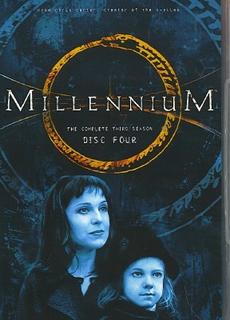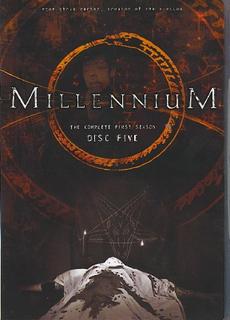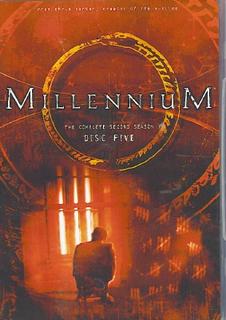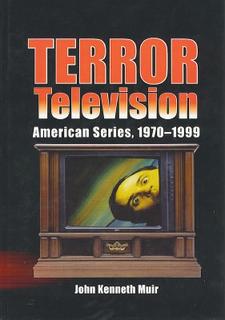 Has there ever been a more influential television program than Chris Carter's brilliant and underrated crime/horror program, Millennium (1996-1999)? I think not, and as evidence I suggest you merely check out the new 2005 Fall TV schedule. Millennium clones dot the schedules of all the major networks, with titles such as Bones, Criminal Minds and Killer Instinct. Don't even get me started on the immensely popular CSI and its various and sundry spin-offs. Millennium focused on forensic pathology, oddball criminals and crafty, perverted serial killers almost a decade ago, and frankly, it did it better than any of these aforementioned shows. Why someone hasn't seriously considered producing a Millennium feature film - or a spin-off/sequel series - is seriously beyond me. But then, nobody pays me to make those decisions.
Has there ever been a more influential television program than Chris Carter's brilliant and underrated crime/horror program, Millennium (1996-1999)? I think not, and as evidence I suggest you merely check out the new 2005 Fall TV schedule. Millennium clones dot the schedules of all the major networks, with titles such as Bones, Criminal Minds and Killer Instinct. Don't even get me started on the immensely popular CSI and its various and sundry spin-offs. Millennium focused on forensic pathology, oddball criminals and crafty, perverted serial killers almost a decade ago, and frankly, it did it better than any of these aforementioned shows. Why someone hasn't seriously considered producing a Millennium feature film - or a spin-off/sequel series - is seriously beyond me. But then, nobody pays me to make those decisions.Millennium ran for three glorious and all too brief seasons on FOX TV in the late nineties, in total broadcasting some sixty-six episodes. All three seasons are now available (and affordable) on DVD Box Sets and I suggest you buy them. The time is now.
Millennium starred the incredibly versatile and charismatic Lance Henriksen in the role of his career, ex-F.B.I. profiler Frank Black, a quiet, haunted man who has suffered two mental breakdowns in his life because of his capacity to "see inside" the minds of killers. As the series begins, he's just moved to a beautiful yellow house in Seattle with his wife, a therapist named Catherine (Megan Gallagher) and his young, gifted daughter, Jordan (Britanny Tiplady). Frank helps the Seattle PD solve difficult crimes from time-to-time, and consults for the mysterious Millennium Group, an organization of ex-F.B.I. professionals (based on the real like Academy Group) dedicated to understanding and apprehending criminals...and also, perhaps, cultivating The End Times. Frank's friend, and later - nemesis - is his sponsor in the Millenniu
 m Group, Peter Watts (Terry O'Quinn). After a series of catastrophic events in the second season, Frank loses confidence in the secretive Group and returns to the F.B.I. Academy at Quantico, teaming up with a young, intelligent agent, Emma Hollis (Klea Scott). Most of his cases there involve the mysterious and odd misdeeds of The Millennium Group. As fans of The X-Files remember, a closing episode of that show, titled - appropriately - "Millennium," brought some sense of closure (but not enough...) to the series.
m Group, Peter Watts (Terry O'Quinn). After a series of catastrophic events in the second season, Frank loses confidence in the secretive Group and returns to the F.B.I. Academy at Quantico, teaming up with a young, intelligent agent, Emma Hollis (Klea Scott). Most of his cases there involve the mysterious and odd misdeeds of The Millennium Group. As fans of The X-Files remember, a closing episode of that show, titled - appropriately - "Millennium," brought some sense of closure (but not enough...) to the series.According to Variety at the time of its premiere near Halloween in '96, Millennium "makes Twin Peaks look like a morning in Romper Room," and the magazine called the series "literate, well-acted and blessed with an irresistible hook...the best new show of the season."(Jeremy Gerard, Variety, October 21-27, 1996, page 212.) John J. O'Connor, writing for The New York Times suggests that creator "Carter pushes all the right apocalyptic buttons...The production values darkly mirror the text."(The New York Times: "The Evil That Lurks All Around," October 25, 1996, page B16). In 1999, after the program finally and sadly left the air, X-Pose Magazine insightfully commented that "Millennium surpassed itself in cultivating relationships between its principal cast" and called the show "a clear artistic success, making sense out of an often chaotic, disturbing world with consummate intelligence and powerful emotions."(X-Pose # 35, "Inner Demons," June 1999, pages 49-51.) Right on.
There are many fine episodes of Millennium that we could focus on for this blog's tenth retro-TV flashback, including the feature-film quality pilot by Chris Carter, the inspiring installment, "Luminary," or the apocalyptic season two cliffhanger "The Fourth Horseman/The Time is Now," but instead I want to highlight a very special trilogy of shows. In each season of Millennium, Frank faced a truly frightening, and if truth be told, enormously sexy antagonis named: Lucy Butler. Played by the gorgeous Sarah-Jane Redmond with diabolical intensity, this was a character who might very well be the devil itself. The audience is introduced to Lucy in the eighteenth episode of the series, aired on April 18, 1997, titled "Lamentation." It's a great show, because it begins with a heavy focus on a Hannibal Lecter-type serious killer, only to shift focus suddenly to a much more evil character, Lucy herself. In this episode, we witness Lucy perform surgery on an unwilling patient...without anesthesia. Written by Chris Carter and directed by Winrich Kolbe, "Lamentation" is also a pivotal episode of Millennium because - after seventeen weeks of serial killers and odd crimes - the series makes its first (stunning...) supernatural twist. Not only is Lucy Butler able to change form into a frightening, dark-haired man at will, but also, perhaps, a horrible demon straight from Hell. You know this episode means business not just for its terrifying set-piece in Frank Black's house, wherein Jordan disappears and Catherine finds a bloody kidney on a plate in the refrigerator, but in the death of a main series character, Frank's pal at the Seattle Police Department, Bletcher (Bill Smitrovich). So powerful is this episode, so important to the evolving series mythos is it, that Lucy Butler re-appears briefly in the follow-up show, "Powers, Principalities, Thrones and Dominions."
In the second season, Lucy Butler returned to vex Frank in what is certainly one of the best episodes of the series, if not the very best. Titled "A Room with No View," this show aired on April 24, 1998, and was written by Ken Horton and directed by series stalwart Thomas Wright. This time, Lucy is abducting exceptional young men - future leaders - and bringing them to a hotel of horrors to break their spirits. If she can succeed in making them "ordinary," she will have killed our future. This is just a brilliant show, featuring Malcolm in the Middle's Christopher Kennedy Masterson as one of the boys doomed to Lucy's tender, horrible ministrations. In horror movies, and horror TV shows, children always represent tomorrow; or the future. So if you kill or destroy the children, you are destroying the future, and this episode literalizes that metaphor. Since Millennium concerns the impending apocalypse, the end of the world by our own hands, this episode about leaders rendered "ordinary" fits in just perfectly with series tenets. After the failures we have seen recently at all levels of government in all our leaders, can anyone deny that, perhaps, Lucy Butler has succeeded?
Ms. Redmond's Lucy Butler returned in Season Three for what is probably the weakest of the three stories featuring her, though still a good one overall. In "Antipas," written by Frank Spotnitz and Chris Carter and directed by Thomas Wright, Lucy - longing for a child of her own to subvert - infiltrates the family of an up-and-coming state politician as a "nanny." Before long she is wreaking havoc on the family, killing the senator's wife and corrupting her young daughter, Divina, into a life of evil. Frank intervenes along with Emma Hollis, but Lucy is up to her devilish old tricks. Especially creepy (and sensual...) is Lucy's late-night visitation to Frank in a motel room. She mounts him and goes to town riding him, only later revealing she is pregnant with his child from this - ahem - encounter. Fortunately, she loses the baby, since that's one more crisis Frank Black just shouldn't have to handle! The final appearance of Lucy Butler in Millennium occurs in the episode "Saturn Dreaming of Mercury," when Frank discovers - again - that evil has a very distinctive face, even in comforting suburbia.

So many episodes of Millennium dealt brilliantly with the idea of "evil" as a concept; of the "End of the World" as a cerebral, intellectual fear. Were we racing to an "apocalypse of our own making?" Were we guaranteed another thousand years, and if so, would it be the "same old crap?" Yet what makes the Lucy Butler trilogy so special is the fact that in these episodes, evil boasts a beguiling and very human form, simultaneously repellant and attractive. This is sort of a perfect expression of the Gothic aesthetic. Whereas many of the lunatics in Millennium are deviant, repugnant characters, Lucy Butler makes evil charming, charismatic...and all the more frightening. It's a good thing Frank is such a steady presence in the series, because he's the only person in the world, I think, who could fight this demon- given-female-form and not be taken in by her treachery and alluring evil. Had the series gone into a fourth season, one wonders what the next clash of Lucy and Frank would have been like, especially given the personal nature of their conflict in "Antipas."
Millennium was so ahead of its time in about a million ways. Back in the 1990s, it featured stories on avian flu-type bugs ("The Fourth Horseman"), stem cell research ("Bardo Thodol"), the Human Genome Project ("Sense and Anti-Sense"), end-of-life issues ("Goodbye Charlie"), the Y2K threat ("TEOTWAWKI") and other stories that would come to dramatically affect the 21st century, and yet, despite such forward-thinking plot scenarios, you could hardly do better than to revisit the terrifying "Lamentation," the highly-disturbing and deeply resonant "Room with No View," and The Omen-like "Antipas." Just three examples of how Millennium had everything you could want in a horror TV series: style, subtext, theme, and brilliant characterization. Lucy Butler is a character - and villain - for the ages.
If you want to read more about Millennium, and other horror series aired from 1970-1999, check out my book, Terror Television. This is how I summarized Millennium there:
"For those who gave up on Millennium and never looked back, please - seek it out now in reruns [DVD!]. Commit to viewing it from start to finish. Such an undertaking will not prove a waste, and on the contrary, will leave one with a bold and invigorating universe of horror to contemplate."
Millennium, suffice it to say, is the reason my house is painted yellow...








John,
ReplyDeleteI wanted to take time to write to you about the Millennium topic.
I thought I would post it here merely to underscore just how powerful this series is as you have articulated.
You're point about this show being three short but "glorious" seasons cannot be overstated.
As a relative newcomer to the series, I must tell you I positively love Millennium. Further, apart from some truly wonderful episodes in a strong first season, I believe Season Two is even stronger.
Granted, the tone and the movement of the series feels significantly different than the first season and I love that about the show.
I think it's move toward a shadowy X-Files styled science fiction was particularly alluring to me here.
I've heard some criticism over time about the move away from the mood and atmosphere of the first season, but apart from the goofy programmer, I still think Season Two offers a potent run. It has been blowing me away. I literally can't wait to get back to the television and see what's next for Frank Black.
Anyway, I really enjoyed this post and the focus on one of my favorite characters in this stunning series. Dare I say it, but I have enjoyed these first two seasons even more than the first two for The X-Files and they were pretty damn good.
I know it's the first time I've commented on Millennium here at your site, but it's never too late. I wanted others to know they should take the dive into Millennium.
This is who we are.
Cheers my friend
sff